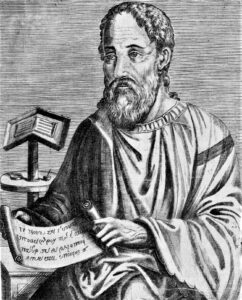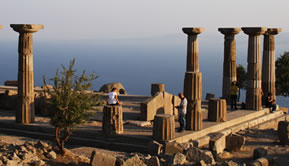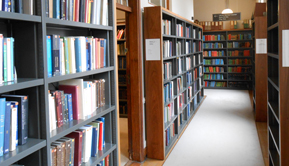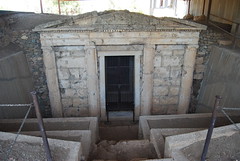When Authors ask “What If?”
Alberto J. Quiroga Puertas on what counterfactual thinking can tell us about the world of Late Antiquity

Eusebius of Caesarea was no stranger to counterfactual thinking (a modern engraving) (Wikimedia Commons)
We often wonder what would have happened if we had made a different decision at a certain point in our lives from the one we did. Did I make a good call when I took up that job offer? Was I right in deciding to pursue a career in this line of work? Did I have one too many pretzels before going to bed? Similarly, it is fairly common for us to fantasize on a larger scale. What would our world be like if Christopher Columbus’s nautical and geographical knowledge had been more accurate, leading him to arrive in what we know today as India? If governments around the globe had reacted more promptly, would the pandemic have been less devastating? These ruminations belong to the realm of counterfactuals – a way of thinking that has been practiced since ancient times and to which we all resort, consciously or unconsciously, in order to assess how far chance and contingency have determined both important historical events and episodes in our own lives.
We are lucky to have a number of texts dealing with theoretical precepts of counterfactuals as well as instances of counterfactual narrations from Greek and Latin sources. In his Poetics, for example, Aristotle states that ‘it is not the poet’s function to relate actual events, but the kinds of things that might occur and are possible in terms of probability or necessity (1451a-b, translation by S. Halliwell). Aristotle, in this way, bestows the poet with the power to break through the fabric of reality to what has already happened (τὰ γενόμενα is the term used for “actual events”) and experiment with his imagination by entering the territory of speculation (note the philosopher’s use of the optative mood to express possibility: οἷα ἂν γένοιτο – “that might occur”).
In imperial times, the rhetorician Theon explicitly encouraged students to hypothesize on alternative historical scenarios as part of the process of composing encomia and invectives: ‘It is useful also to conjecture about the future on the basis of past events, as if one were to say about Alexander of Macedon, “What would he, who overthrew many great peoples, have done if he had lived a little longer?” And like Theopompus in the encomion of Philip, that if Philip wanted to continue the same practices, “He will be king of all Europe”’ (Progymnasmata 110-111, translation by G.A. Kennedy).
Theon’s theoretical considerations are taken a step further in Titus Livius’ digression on the historical consequences of an imaginary attempt to conquer Rome by Alexander the Great. In what is, perhaps, the closest instance of counterfactual speculation to what we could now call “uchronia”, the historian confesses his wish to voice ‘thoughts which I have often silently pondered in my mind’ (History of Rome, IX.17-19, translation by B.O. Foster), a phrase that suggests that conjecturing on alternate scenarios was not entirely unusual. Livius’ excursus is filled with “what if”, “would have” and “could have”, clauses that describe the challenges Alexander might have faced in this alternative past. In any of those scenarios, the historian assures us, Rome would have prevailed and would continue to prevail ‘if only our present love of domestic peace endures and our concern to maintain concord’.
Modern historians and philosophers agree that explorations of what would or could have happened in alternate pasts like Livius’ flourish in periods of significant change. There is absolutely no doubt that Late Antiquity can be labeled as one such turning-point, witnessing, as it did, a great many transformations at all levels due to the process of the Christianization of the Roman Empire. Those changes sparked debates and confrontations on different topics, one of which was what was to be done with illustrious pagan figures who lived before Christ. Did they have to be viewed in the same way as other pagans, or could they be regarded as Christians avant la lettre because they acted and thought as Christians did without knowing it?
Lactantius addressed this issue in his Divine Institutes. As he set out to discredit pagan myths using rhetorical strategies based on euhemerist interpretations, he employed counterfactual arguments by insisting that some important pagan figures would have been Christians if they had followed their instincts: ‘If only Orpheus or our two Roman poets [Virgil and Ovid] had persisted in standing by what nature led them to feel, they would have understood the truth and would have grasped the doctrine that we accept’ (I.5: translated by A. Bowen and P. Garnsey).
In relation to polemics and apologetics, counterfactuals in Late Antiquity were primarily used as a means to explore what would have become of Christianity if certain events had had a different outcome. In this context, two relevant historical figures from the fourth century stand out: the emperor Constantine, whose political moves facilitated tolerance and the regularization of Christianity, and the emperor Julian, who meant to stop and reverse the process of Christianization by introducing new policies that would establish a Neoplatonic order.
The place of honour accorded Constantine in Late Antique Christian literature is sometimes reinforced with descriptions of situations that would have hindered Christians if Constantine had not been emperor. In his hagiographic Life of Constantine, the bishop Eusebius of Caesarea tells us that Licinius, Constantine’s co-ruler yet enemy for a decade, would have started another persecution against Christianity ‘had not the Champion of his own people anticipated the event, and lit a great lantern in the darkness and blackest night, when he guided to these parts his servant Constantine’ (translation by A. Cameron and S.G. Hall). Similarly, when it came to internal divisions within Christianity, Eusebius states that theological differences would have started wars had it not been for the intervention of God and Constantine (e.g., Life of Constantine III.59).
Although his time as sole emperor was short (361–363 AD), Julian’s political and religious program was also scrutinized through the lens of counterfactuals. On his tendency to make sacrifices to the gods, a friendly source, the historian Ammianus Marcellinus, tells us that if Julian had survived his campaign against the Persians, there would have been a shortage of oxen to offer the gods in sacrifices (XXV.4.17). Another historian, Eutropius, lamented Julian’s death as he ‘would have governed the state remarkably well if the fates have allowed’ (Breviarium X.16, translated by H.W. Bird). Wishful thinking like that of Eutropius was also uttered by the Church historian Socrates Scholasticus – a harsh critic of Julian – when he reflected upon the character of Julian’s successor, the emperor Jovian: ‘indeed the Roman empire, blest with so excellent a sovereign, would doubtless have flourished exceedingly, as it is likely that both the civil and ecclesiastical departments would have been happily administered, had not his sudden death bereft the state of so eminent a personage” (HE III.26, translated by A.C. Zenos).
But the use of counterfactual postulates was not restricted to the narration of important historical events. On a smaller scale, “what if” arguments also featured prominently in biographical and autobiographical narratives, a type of literature of which there was no shortage in the Late Antique period. The writings of the pagan sophist Libanius of Antioch (314–393 AD) and of the theologian Augustine of Hippo (354–430 AD) are particularly relevant when it comes to examining how counterfactuals worked in the narration of personal stories. The former composed his Autobiography in order to extol his own virtues at a time when he felt that his influence in the cultural and social milieu was declining. In the first sections of this work, Libanius looks back at his origins and muses on what his life would have been like if his father had lived longer:
In which category, then, shall I put my orphan’s state? Gladly would I have beheld my father in his old age, but of one thing I am certain – that if my father had come to a ripe old age, I would now be engaged upon a very different way of life. If you compare the present with the might-have-been – a career in local politics, for instance, or law, or even in the imperial administration – you would have no difficulty in discovering which would be the correct estimate of my fortune
Or. 1.6, translation by A.F. Norman
By imagining an alternative life in which he would have ended up pursuing an undesired career in administration, Libanius publicly acknowledges that his life and work have been protected by Fortune (Τυχή), his tutelar goddess and the dedicatee of his Autobiography.
In the case of Augustine, the rationale of his Confessions – repentance of his way of life previous to his religious conversion – lends itself to the use of counterfactuals as an appropriate way to express what would have become of him if he had not changed and embraced Christianity. In this sense, the enumeration of his youthful sins of flirting with Manichaeism before converting are narrated in detail in order to contrast his unrighteous past with his devout present. In doing so, Augustine created comparisons between two different periods of his life which, on some occasions, take the shape of alternate pasts. Here he recalls the time he embarked on Platonic readings:
If I had been first formed by Your Holy Scriptures so that You had grown sweet to me through their familiar use, and had come later upon those books of the Platonists, they might have swept me away from the solid ground of piety; and even if I had remained firm in that disposition which for my health Scripture had taught me, I might perhaps have thought that the same disposition could have been acquired from those books if a man studied them alone.
Augustine, Confessions, VII.20, translation by F.J. Sheed
The anecdotic tinge and brief length of the texts based on counterfactual premises may be regarded as mere speculations without any further implications on their respective narratives. However, in my view, the use of these counterfactuals enriches our knowledge of the Late Antique world. The analysis of how Late Antique authors envisioned alternate scenarios offers us a precious window into their fears, hopes, and concerns. Counterfactual thinking was an exercise in imagination and retrospection preserved in their works that we all practice on a daily basis. After all, who does not wake up and think, as Libanius or Augustine did, what their life would be like if the decisions they made or the historical circumstances that have shaped their life had been different?
Alberto J. Quiroga Puertas is currently undertaking research in this area as part of a project funded by Fundación BBVA. Proyecto Logos.









